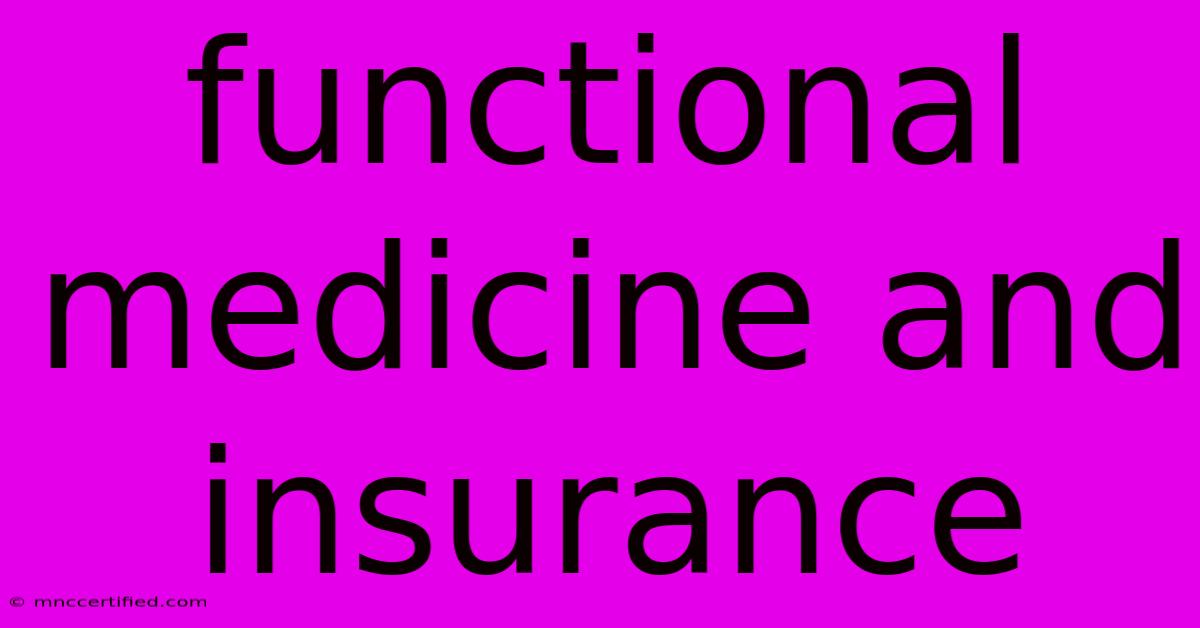Functional Medicine And Insurance

Table of Contents
Functional Medicine and Insurance: Navigating the Coverage Maze
Finding the right healthcare approach is crucial for your well-being, and functional medicine is gaining popularity for its holistic approach. But a common question arises: Does insurance cover functional medicine? The answer, unfortunately, isn't a simple yes or no. Understanding the complexities of insurance coverage for functional medicine requires careful consideration.
Understanding Functional Medicine
Functional medicine differs significantly from conventional medicine. Instead of focusing solely on treating symptoms, functional medicine aims to identify and address the root causes of illness. This involves a thorough examination of your lifestyle, genetics, environment, and diet to create a personalized treatment plan. This personalized approach often includes:
- Extensive initial consultations: These consultations are far more in-depth than typical doctor visits, requiring more time and often resulting in higher costs.
- Specialized testing: Functional medicine often involves advanced lab tests that may not be routinely covered by insurance. These can include tests for food sensitivities, gut microbiome analysis, and hormonal imbalances.
- Holistic therapies: Treatments may extend beyond pharmaceuticals, encompassing nutritional guidance, lifestyle changes, and supplements. Insurance coverage for these complementary therapies is highly variable.
Insurance Coverage: The Gray Areas
The biggest challenge with insurance coverage for functional medicine is that many insurance providers consider functional medicine tests and treatments to be "alternative" or "integrative," meaning they may not be covered under standard plans. Here's why:
- Lack of standardization: Functional medicine lacks the widespread standardization and clinical trial data that many insurance companies require for coverage.
- Cost considerations: The extensive testing and individualized treatment plans are inherently more expensive than traditional medical approaches, making them less attractive to insurance providers.
- Plan variations: Coverage varies dramatically depending on your specific insurance provider, plan type (HMO, PPO, etc.), and even your geographical location.
Maximizing Your Chances of Coverage
While complete coverage might be unlikely, you can still explore ways to optimize your insurance benefits:
1. Check Your Policy Carefully
Thoroughly review your insurance policy's details, focusing on sections covering "alternative medicine," "integrative medicine," or "out-of-network" providers. Some plans might partially cover certain tests or treatments if they are deemed medically necessary. Don't hesitate to contact your insurance provider directly to inquire about specific codes and procedures used in functional medicine.
2. Find In-Network Providers
While rare, some functional medicine practitioners may be in-network with certain insurance companies. Contact your insurance provider to obtain a list of in-network providers specializing in integrative or holistic medicine.
3. Prior Authorization and Appeals
For services not automatically covered, you may need to obtain prior authorization from your insurance company. This involves submitting a detailed request justifying the medical necessity of the specific functional medicine tests or treatments. If your claim is denied, understand your rights to appeal the decision.
4. Consider HSA/FSA Accounts
Health Savings Accounts (HSAs) and Flexible Spending Accounts (FSAs) can help offset out-of-pocket expenses for functional medicine services not covered by insurance.
Beyond Insurance: Affordability Strategies
Even with strategic planning, functional medicine can be expensive. To manage costs:
- Prioritize Essential Tests: Discuss with your practitioner which tests are most crucial and prioritize those first.
- Explore Payment Plans: Many functional medicine practitioners offer payment plans to make treatment more accessible.
- Seek Financial Assistance: Inquire about potential financial assistance programs offered by your provider or local community resources.
Conclusion: A Proactive Approach
Navigating insurance coverage for functional medicine requires research, communication, and a proactive approach. While complete coverage may be challenging, understanding your policy, engaging with your insurer, and considering alternative payment options can significantly improve the accessibility and affordability of this holistic healthcare approach. Remember, your health is an investment; actively managing the financial aspect of functional medicine is a key component of achieving your wellness goals.

Thank you for visiting our website wich cover about Functional Medicine And Insurance. We hope the information provided has been useful to you. Feel free to contact us if you have any questions or need further assistance. See you next time and dont miss to bookmark.
Featured Posts
-
Boise State Wins 4 0 Start
Nov 19, 2024
-
Gynecomastia Covered By Insurance
Nov 19, 2024
-
Live Stream Croatia Vs Portugal Uefa Match
Nov 19, 2024
-
Utah Thanksgiving Dinner Where To Go
Nov 19, 2024
-
Apollo Car Insurance Phone Number
Nov 19, 2024